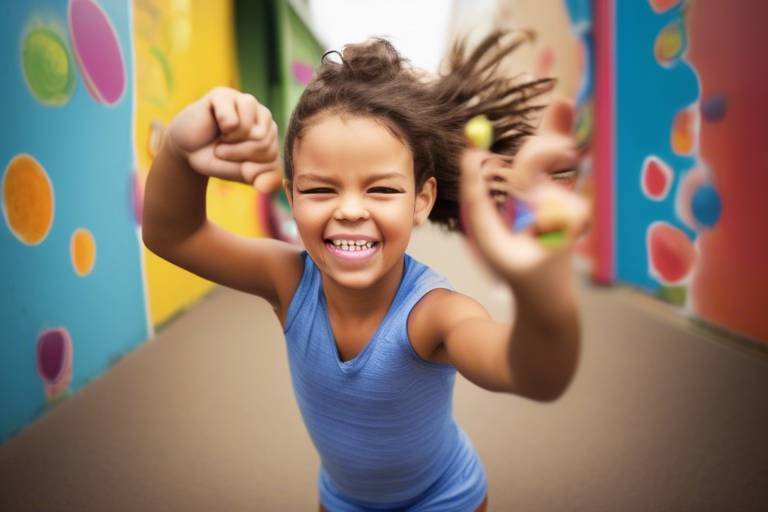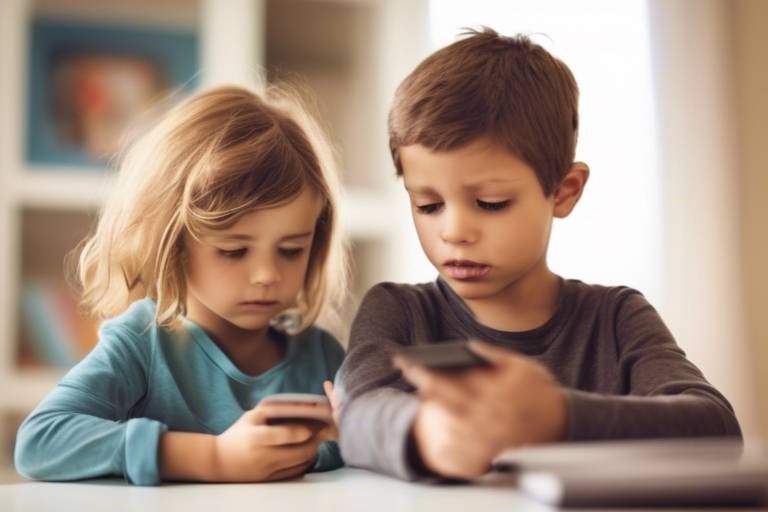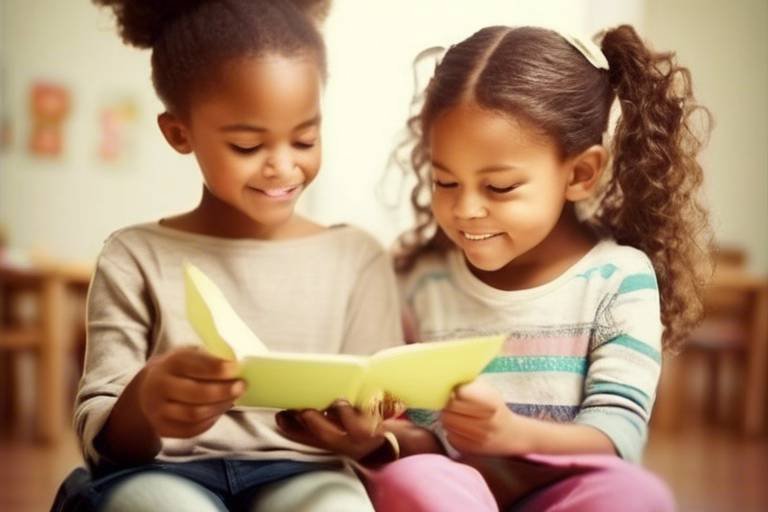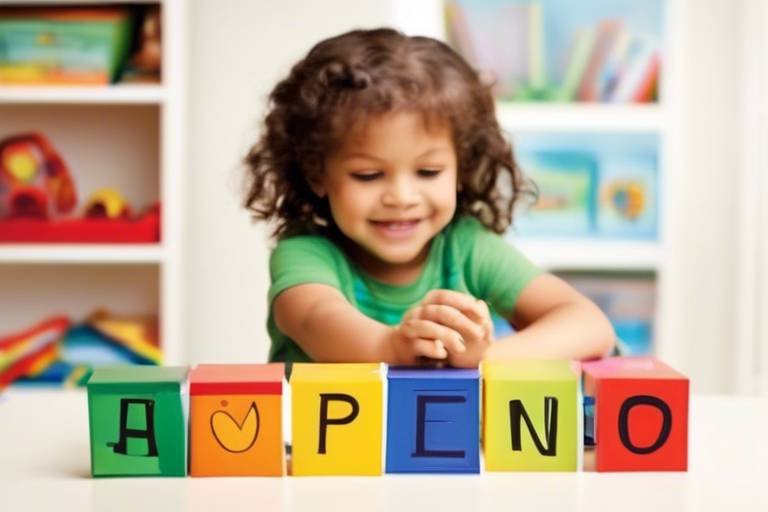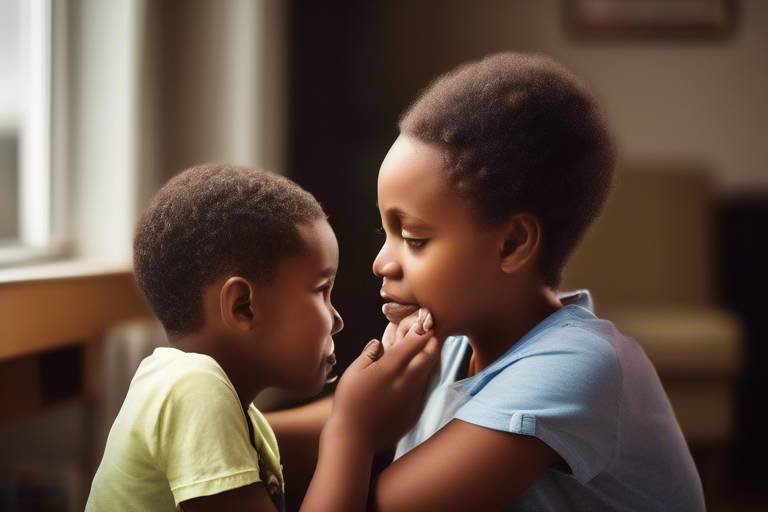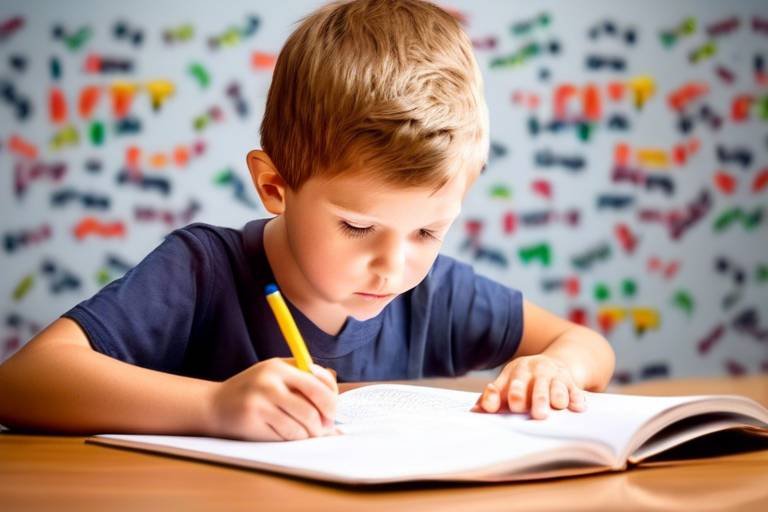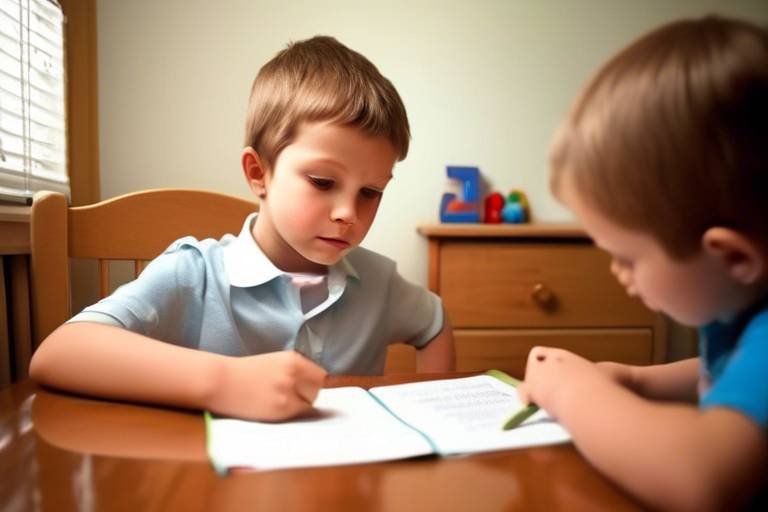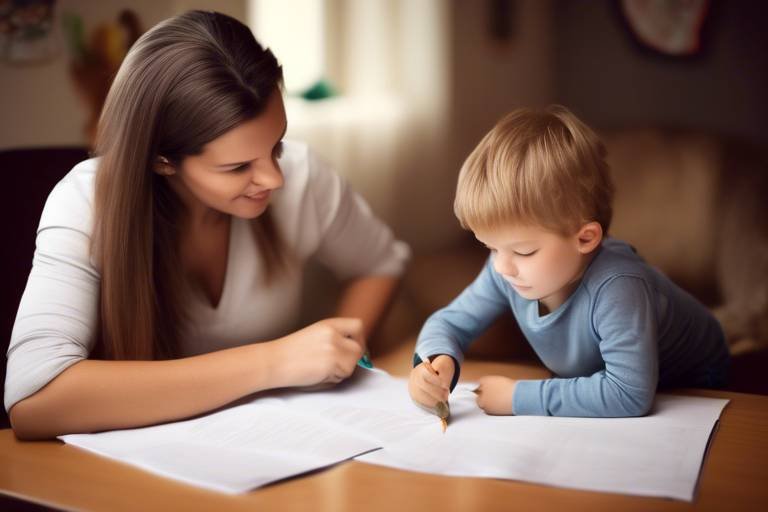Navigating Friendships in Early Childhood: A Guide
Friendships during early childhood are more than just playdates and shared snacks; they are the building blocks of social development. Imagine a world where every child feels a sense of belonging, where laughter echoes through playgrounds, and where bonds are formed that can last a lifetime. This article dives deep into the importance of these early friendships, exploring how they shape emotional intelligence, social skills, and even conflict resolution. By understanding the dynamics of children's friendships, caregivers and educators can create nurturing environments that foster healthy relationships and encourage collaboration. So, let's embark on this journey together, unraveling the intricate tapestry of childhood friendships!
Friendships in early childhood are crucial for emotional and social development, providing children with a sense of belonging and opportunities to learn essential interpersonal skills that will benefit them throughout their lives. When children engage with their peers, they not only enjoy fun moments but also develop vital skills like empathy, cooperation, and communication. Think of friendships as the first stepping stones in a vast river of social interactions; the stronger these stones, the easier it is for children to navigate their social world. Without these connections, children might struggle to understand their emotions or relate to others, which can lead to feelings of isolation.
Understanding the different types of friendships children form can help caregivers and educators foster healthier relationships, encourage collaboration, and support social development in various contexts, such as playdates, preschool, and community activities. Children often form friendships based on shared interests, proximity, or even mutual experiences. For instance, a child might bond with a neighbor over a love for dinosaurs, while another may connect with a classmate during a group project. Recognizing these types can guide adults in facilitating meaningful interactions.
Playground interactions are vital for developing social skills. Through unstructured play, children learn cooperation, negotiation, and conflict resolution, which are fundamental components of building and maintaining friendships. Picture a bustling playground filled with children swinging, sliding, and playing tag. In this vibrant environment, kids are not just having fun; they are learning to navigate social hierarchies, express their feelings, and understand the importance of sharing. Each interaction, whether it involves laughter or a minor disagreement, serves as a lesson in social dynamics.
Imaginative play allows children to explore different roles and scenarios, promoting creativity and empathy. This type of play is instrumental in forming connections and understanding perspectives within friendships. When kids engage in pretend play, they step into various characters, whether it's a superhero saving the day or a chef cooking a grand meal. Through these roles, they learn to empathize with others' feelings and viewpoints, which is essential for building strong friendships. It's like a rehearsal for real-life interactions, helping them to navigate the complexities of human relationships.
Conflict is a natural part of friendships. Teaching children effective strategies for resolving disagreements helps them develop resilience, communication skills, and the ability to maintain relationships despite challenges. Just like in any good story, friendships will encounter bumps along the way. Whether it's a disagreement over toys or a misunderstanding during a game, these conflicts can be opportunities for growth. By guiding children on how to express their feelings and find common ground, caregivers can empower them to handle disputes constructively.
Caregivers play a significant role in shaping children's social experiences. By modeling positive interactions and providing guidance, they can help children navigate friendships and develop healthy social behaviors. Children often mimic the behaviors and attitudes of the adults around them. When caregivers demonstrate kindness, empathy, and effective communication, children are more likely to adopt these traits in their own friendships. It's like planting seeds in a garden; with the right care and attention, those seeds can blossom into beautiful relationships.
Fostering social skills in early childhood is essential for building strong friendships. Activities that promote sharing, empathy, and communication can enhance children's ability to connect with peers and form meaningful relationships. Think of social skills as the tools in a toolbox; the more tools a child has, the better equipped they are to build strong connections. Engaging in group activities, storytelling, and role-playing can provide children with the practice they need to develop these skills effectively.
Structured group activities, like team sports or collaborative projects, provide children with opportunities to practice social skills in a supportive environment, encouraging teamwork and friendship development. These activities not only promote physical health but also teach children how to work together towards a common goal. Imagine a soccer game where every child has a role to play; they learn to rely on one another, communicate effectively, and celebrate each other's successes.
Emotional intelligence is crucial for forming and maintaining friendships. Teaching children to recognize and manage their emotions can lead to healthier interactions and deeper connections with their peers. Just as a musician learns to tune their instrument, children must learn to tune into their feelings and those of others. By fostering emotional awareness, caregivers can help children navigate the ups and downs of friendships with grace and understanding.
- Why are friendships important in early childhood? Friendships help children develop social skills, emotional intelligence, and a sense of belonging.
- How can caregivers support children's friendships? By modeling positive behavior, facilitating playdates, and teaching conflict resolution skills.
- What role does imaginative play have in friendships? It promotes empathy and helps children understand different perspectives, which is crucial for building connections.

The Importance of Early Friendships
Friendships during early childhood are not just about having fun; they play a crucial role in a child's emotional and social development. Imagine a world where children navigate their feelings, learn to share, and understand the nuances of communication—all through their interactions with friends. These early relationships provide a sense of belonging that is fundamental to a child's sense of self. When children engage in friendships, they embark on a journey that helps them develop essential interpersonal skills that will serve them well throughout their lives.
Think about it: every time a child plays with a friend, they are not just passing the time. They are learning how to express their feelings, negotiate terms of play, and even resolve conflicts. These seemingly simple interactions are the building blocks of social competence. Studies have shown that children who form strong friendships early on tend to have better emotional regulation and higher levels of empathy. They learn to recognize and respond to the emotions of others, which is a skill that will benefit them in every relationship they build in the future.
Furthermore, early friendships provide children with a safe space to experiment with different social roles. Through these interactions, they learn about trust, loyalty, and the importance of being there for one another. This is where the magic happens—children start to understand that friendships require effort and nurturing. They discover that it's not just about having fun; it's about supporting each other through thick and thin.
To illustrate this point, let’s consider the various benefits of early friendships:
| Benefit | Description |
|---|---|
| Emotional Support | Friends provide a safe haven for children to express their feelings and seek comfort. |
| Social Skills Development | Through interactions, children learn essential skills like sharing, listening, and communication. |
| Conflict Resolution | Friendships teach children how to navigate disagreements and find solutions. |
| Increased Self-Esteem | Having friends boosts a child's confidence and sense of belonging. |
In conclusion, the importance of early friendships cannot be overstated. They are the foundation upon which children build their social lives. By fostering these relationships, we are not only enriching their childhood experiences but also equipping them with the tools they need to thrive in their future interactions. So, let’s encourage our little ones to make friends, play together, and build those invaluable connections that will last a lifetime.

Friendships in early childhood come in various forms, each playing a unique role in a child's social development. Understanding these types can help parents, caregivers, and educators foster healthier relationships among children. It's fascinating to observe how children navigate their social landscapes, often forming bonds that reflect their personalities and needs. Let's dive deeper into the different types of friendships children experience during these formative years.
Firstly, we have playground friendships, which often develop in informal settings like parks or schoolyards. These friendships are characterized by spontaneous interactions during play. Children learn to share, take turns, and resolve conflicts, all of which are essential skills for building lasting relationships. Playground friendships are often fluid, meaning that they can change from day to day, depending on the games being played and the dynamics of the group.
Next, there are close friendships, which typically form between children who share similar interests or experiences. These friendships can be more stable and involve deeper emotional connections. Children may confide in their close friends, share secrets, or collaborate on projects. Such relationships teach children about loyalty and trust, which are critical components of any healthy friendship.
Another type is associative friendships, where children engage in group activities but may not have a strong emotional bond. Think of it as a friendly alliance formed over a shared interest, like a love for a specific game or activity. These friendships are essential as they help children learn to cooperate with others and develop social networks, laying the groundwork for future relationships.
In addition, children often engage in role-based friendships, where they take on specific roles during play. For example, one child might be the "teacher," while another is the "student." This kind of imaginative play not only fosters creativity but also helps children understand different perspectives, which is vital for empathy and social understanding. Through these role-based interactions, children can explore various social dynamics and learn how to adapt their behavior to different situations.
Lastly, we can't forget about temporary friendships, which often occur during events like birthday parties or community activities. These connections may be short-lived but are still significant. They allow children to practice social skills in new environments and meet diverse peers. Temporary friendships can spark curiosity and broaden a child's social horizons, encouraging them to step outside their comfort zones.
In summary, the types of friendships children form can vary widely, each contributing to their overall social development. Recognizing these different forms can empower caregivers and educators to create supportive environments that nurture healthy social interactions. By understanding the dynamics of these friendships, we can better guide children as they learn to navigate the complex world of relationships.
- What is the significance of early friendships? Early friendships are crucial for emotional and social development, helping children learn valuable interpersonal skills.
- How can caregivers encourage healthy friendships? By modeling positive social interactions and facilitating playdates, caregivers can help children develop strong social skills.
- What role does imaginative play have in friendships? Imaginative play fosters creativity and empathy, allowing children to explore different roles and perspectives in their friendships.

Playgrounds are not just fun zones filled with swings and slides; they are vibrant social ecosystems where children learn some of their most important social skills. Imagine stepping into a bustling playground: the laughter, the shouts, the occasional squabbles. Each interaction is a mini-lesson in cooperation, negotiation, and conflict resolution. As children engage in unstructured play, they navigate a world of social dynamics that is both exciting and challenging. It's here that they learn to share toys, take turns, and even figure out how to handle disagreements with their peers. These experiences are crucial as they lay the groundwork for friendships that can last a lifetime.
When kids play together, they often find themselves in situations that require teamwork. For example, while building a sandcastle, they must decide who gets to choose the design, how to gather materials, and how to work together to bring their vision to life. This type of collaboration not only fosters a sense of community but also teaches children the importance of listening to others' ideas and compromising to achieve a common goal. Just like a well-oiled machine, every child’s contribution is vital to the success of their play project.
Moreover, the playground is a perfect stage for practicing conflict resolution. Disagreements are bound to happen—perhaps someone wants to play a different game than the others or feels left out of a group activity. Instead of stepping in to resolve these issues for them, caregivers can encourage children to express their feelings and find solutions together. This process teaches them valuable lessons about empathy and communication. For instance, a child might say, “I feel sad when I can’t play, can we take turns?” Such dialogues are essential for developing resilience and the ability to maintain friendships even when faced with challenges.
Additionally, the playground serves as a microcosm of the larger world. Children encounter peers from diverse backgrounds, each bringing their own unique perspectives and play styles. This diversity enriches their social experiences and teaches them to appreciate differences. Through these interactions, children learn that friendships can flourish in various forms, whether it’s a quick game of tag or a more involved activity like a treasure hunt. Each experience is a building block that contributes to their social development.
In summary, playground dynamics are an essential part of childhood. They provide a rich environment for children to develop critical social skills, learn to navigate relationships, and understand the importance of cooperation and conflict resolution. Just like a fine dance, every step taken on the playground helps children become more adept at building and maintaining friendships that will serve them well into adulthood. So, the next time you watch children play, remember that they are not just having fun; they are mastering the art of friendship!
- Why are friendships important in early childhood?
Friendships during early childhood are vital for emotional and social development, providing children with a sense of belonging and opportunities to learn essential interpersonal skills. - How can caregivers support children's social development?
Caregivers can support social development by modeling positive interactions, encouraging play, and guiding children through conflicts. - What role does imaginative play have in friendships?
Imaginative play fosters creativity and empathy, allowing children to explore different roles and understand perspectives within friendships. - How can conflict be managed among children?
Teaching children effective strategies for resolving disagreements helps them develop resilience, communication skills, and the ability to maintain relationships.

Imaginative play is not just a fun way for children to pass the time; it is a crucial component in their social development. Through this type of play, children have the opportunity to step into different roles, explore various scenarios, and express their creativity. It's like opening a door to a world where they can be anything from a brave knight to a nurturing parent, allowing them to understand and appreciate different perspectives. When children engage in imaginative play, they are essentially rehearsing for real-life social interactions, which helps them build empathy and cooperation skills.
Consider a scenario where a group of children decides to play "house." As they take on different roles, they must negotiate who will be the parent, the child, or the pet. This negotiation process is a perfect example of how imaginative play fosters important social skills. Children learn to communicate their ideas, listen to others, and come to a consensus. They are not just playing; they are practicing real-life skills that will benefit them in their friendships and interactions as they grow older.
Moreover, imaginative play allows children to experiment with emotions in a safe environment. They can act out feelings of joy, sadness, frustration, or excitement without the real-world consequences that come with those emotions. This exploration helps them to recognize and articulate their feelings, making them more emotionally intelligent. For instance, if a child pretends to be sad because their toy is "broken," they are not only practicing empathy towards their toy but also learning to express their emotions and understand the feelings of others.
In addition, imaginative play can take many forms, including:
- Role-playing games
- Dramatic play with costumes
- Storytelling and puppet shows
- Building forts or creating elaborate settings for their play
Each of these activities encourages children to collaborate, share ideas, and resolve conflicts, which are essential skills for maintaining friendships. When children engage in these playful interactions, they are not just having fun; they are building the foundation for healthy relationships that will last a lifetime.
In summary, imaginative play is a powerful tool in early childhood development. It nurtures creativity, fosters social skills, and enhances emotional intelligence, all while allowing children to explore their world in a safe and engaging way. As caregivers and educators, encouraging imaginative play can lead to stronger friendships and a more harmonious social environment for children.
- What is imaginative play? Imaginative play is a type of play where children create scenarios and roles, allowing them to explore their creativity and emotions.
- How does imaginative play help with social skills? It encourages negotiation, communication, and empathy as children interact and collaborate with their peers.
- Can imaginative play impact emotional intelligence? Yes, it allows children to express and understand their emotions and those of others, enhancing their emotional intelligence.
- What are some examples of imaginative play? Examples include role-playing games, dramatic play, storytelling, and creating elaborate settings for play.

Conflict is as natural to friendships as peanut butter is to jelly. It's almost inevitable that children will face disagreements, misunderstandings, or even the occasional squabble as they navigate their social landscapes. However, rather than viewing conflict as a negative experience, it can be seen as a valuable opportunity for growth and learning. Teaching children effective strategies for managing conflict is essential not only for their current relationships but also for their future interactions as they grow.
When children encounter conflict, they often respond with strong emotions. They might feel hurt, frustrated, or even angry. As caregivers, it's important to help them recognize these feelings without letting them spiral out of control. One way to do this is by introducing simple techniques for emotional regulation. For instance, encourage children to take deep breaths or count to ten before responding. This pause can help them gather their thoughts and approach the situation more calmly.
Next, it’s crucial to teach children the importance of communication during conflicts. They should learn to express their feelings using "I" statements, such as "I feel sad when you take my toy." This approach helps them articulate their emotions without blaming the other person, which can lead to a more constructive dialogue. It’s about fostering a sense of empathy, allowing them to see things from their friend’s perspective. Here’s a quick overview of some effective strategies:
- Active Listening: Encourage children to listen to their friend's side of the story without interrupting. This builds respect and understanding.
- Finding Common Ground: Help them identify areas of agreement. For example, both children may want to play with the same toy, so they can take turns.
- Problem Solving: Teach them to brainstorm solutions together. This could involve negotiating a compromise that satisfies both parties.
By equipping children with these tools, we not only help them resolve conflicts but also instill resilience. They learn that disagreements are not the end of a friendship but rather a stepping stone to deeper connections. It’s like learning to ride a bike; falling down is part of the process, but getting back up is what makes them stronger.
Moreover, caregivers can model conflict resolution skills in their own interactions. Children learn by observing, so demonstrating how to handle disagreements in a calm and respectful manner can provide them with a real-life template to follow. Sharing personal stories of conflict and resolution can also make this learning process relatable and engaging.
In conclusion, managing conflict is an essential skill that children need to develop. By teaching them how to handle disagreements constructively, we prepare them for a future where they can build and maintain healthy relationships. Remember, every conflict is an opportunity for growth, and with the right guidance, children can learn to navigate these challenges with confidence and grace.
Q: How can I help my child when they face conflict with friends?
A: Start by listening to your child's perspective and validating their feelings. Encourage them to express their emotions and guide them through the conflict resolution strategies mentioned above.
Q: Is conflict always a bad thing in friendships?
A: Not at all! Conflict can be a natural part of any relationship and, when handled correctly, can strengthen friendships by fostering communication and understanding.
Q: What if my child struggles to resolve conflicts on their own?
A: If your child finds it challenging to navigate conflicts, consider role-playing different scenarios with them. This can help them practice their communication and problem-solving skills in a safe environment.

Caregivers play a crucial role in shaping children's social experiences and interactions. From parents to teachers, the influence of these adults can significantly impact how children form friendships and navigate their social worlds. When caregivers model positive behaviors, such as effective communication and empathy, children are more likely to adopt these traits themselves. Imagine a child observing their parent resolving a disagreement with a neighbor: they learn not just about conflict resolution but also about the importance of maintaining relationships. This modeling is like planting seeds in a garden; with the right care, these seeds can blossom into strong interpersonal skills.
Furthermore, caregivers can create environments that encourage social interaction. For instance, hosting playdates or participating in community activities allows children to practice their social skills in a safe and supportive setting. During these interactions, caregivers can step in to guide the children when conflicts arise, teaching them how to navigate disagreements constructively. Think of caregivers as the coaches in a sports team; they provide guidance, support, and feedback, helping the players (children) develop their skills over time.
It’s also essential for caregivers to recognize the individuality of each child. Some children may be naturally more outgoing, while others might be shy. Understanding these differences allows caregivers to tailor their approach, offering support and encouragement to those who need it most. For example, a caregiver might encourage a shy child to take the lead in a group activity, fostering confidence and social skills. By doing so, they create a nurturing atmosphere where every child feels valued and understood.
Moreover, caregivers can help children understand the dynamics of friendships. Discussing topics such as sharing, trust, and respect can enhance children's understanding of what it means to be a good friend. Engaging in conversations about their feelings can also promote emotional intelligence, allowing children to articulate their emotions and understand those of others. This is akin to teaching a child to read a map before embarking on a journey; it equips them with the tools they need to navigate their social landscape successfully.
In summary, the influence of caregivers in early childhood cannot be overstated. By modeling positive behaviors, creating supportive environments, recognizing individual needs, and facilitating discussions about friendships, caregivers lay the foundation for healthy social interactions. Just as a gardener tends to their plants, caregivers nurture the growth of social skills in children, helping them flourish in their friendships.
- How can caregivers model positive social behavior? Caregivers can demonstrate effective communication, empathy, and conflict resolution through their interactions with others.
- What role do playdates play in developing friendships? Playdates provide children with opportunities to practice social skills and interact with peers in a safe environment.
- How can caregivers help shy children? Encouraging shy children to participate in group activities and providing gentle support can help them build confidence in social settings.
- Why is emotional intelligence important for friendships? Emotional intelligence helps children understand their own emotions and those of others, leading to healthier and more meaningful relationships.

Fostering social skills in early childhood is essential for building strong friendships. These skills are not just about knowing how to play nicely; they encompass a range of abilities that help children connect with their peers on a deeper level. Think of social skills as the glue that holds friendships together, enabling children to navigate the complex world of interactions. When children learn to share, empathize, and communicate effectively, they create a solid foundation for meaningful relationships that can last a lifetime.
One effective way to encourage the development of social skills is through structured activities. These activities, such as team sports or collaborative projects, provide children with opportunities to practice social skills in a supportive environment. Imagine a group of kids working together to build a fort; they must communicate their ideas, negotiate roles, and resolve conflicts—all of which are crucial components of friendship. Here’s a quick look at how structured activities can enhance social skills:
| Activity Type | Social Skills Developed |
|---|---|
| Team Sports | Teamwork, cooperation, communication |
| Group Projects | Collaboration, problem-solving, leadership |
| Art Classes | Sharing, creativity, expression |
In addition to structured activities, it’s vital to focus on the role of emotional intelligence. This means teaching children to recognize and manage their emotions, which is crucial for forming and maintaining friendships. When children can identify their feelings, they are better equipped to express themselves and understand the emotions of others. For instance, if a child feels upset after losing a game, helping them articulate that feeling can lead to healthier interactions and deeper connections with their peers.
Let’s not forget the importance of modeling behavior. Children learn by observing those around them, especially caregivers. When adults demonstrate positive social interactions, children are likely to mimic those behaviors. Whether it’s showing kindness to a stranger or resolving a disagreement calmly, these actions provide a blueprint for children to follow. Encouragement from caregivers also plays a significant role—praising children when they exhibit good social skills reinforces those behaviors and motivates them to continue practicing.
Ultimately, the goal is to create an environment where children feel safe to explore their social world. Encouraging open communication, providing guidance during conflicts, and celebrating their successes can help children develop the confidence needed to navigate friendships effectively. Remember, the journey of building social skills is ongoing, and every interaction is an opportunity for growth.
- What are some signs that my child is developing social skills?
Look for signs like sharing toys, initiating play, or expressing empathy towards others. - How can I help my child manage conflict with friends?
Teach them to express their feelings, listen to the other person's perspective, and find a compromise. - What activities can enhance my child's social skills?
Consider enrolling them in team sports, art classes, or group playdates that encourage collaboration.

Structured activities play a pivotal role in the social development of young children. These activities are not just about keeping kids busy; they are designed to promote interaction, cooperation, and the development of essential social skills. Think of structured activities as a carefully crafted recipe where each ingredient contributes to a delicious outcome—strong friendships and social competence. When children engage in team sports, group projects, or collaborative games, they are not only having fun but also learning how to work with others towards a common goal.
During these activities, children are often faced with scenarios that require them to communicate effectively, share responsibilities, and negotiate roles. For instance, in a soccer game, a child must learn to pass the ball, understand team dynamics, and celebrate victories or cope with losses together. This shared experience fosters a sense of belonging and creates bonds that can last a lifetime. Moreover, structured activities provide a safe space for children to express themselves and explore their identities while learning the importance of empathy and respect for others.
To illustrate the benefits of structured activities, let’s consider a few popular options:
- Team Sports: Engaging in sports like soccer, basketball, or swimming teaches children teamwork and discipline.
- Art Projects: Collaborative art projects encourage creativity and allow children to share ideas and appreciate different perspectives.
- Music Groups: Participating in choir or band helps children learn to listen and harmonize with others, fostering a sense of unity.
In addition to promoting social skills, structured activities can also help children develop a sense of responsibility and time management. For example, participating in a community service project requires children to plan, execute, and reflect on their contributions, teaching them the value of giving back and working together for a cause. When children engage in these activities, they not only build friendships but also gain confidence in their abilities to collaborate and contribute meaningfully to a group.
Ultimately, structured activities serve as a foundation for children to develop social skills that will benefit them throughout their lives. They provide opportunities for children to practice cooperation, communication, and conflict resolution in a controlled environment. So, whether it’s through sports, arts, or community service, encouraging participation in structured activities can significantly enhance a child's social development and help them forge lasting friendships.
- What are structured activities? Structured activities are organized events or tasks designed to promote social interaction and skill development among children, such as team sports or group projects.
- How do structured activities benefit children? They help children develop essential social skills, such as teamwork, communication, and conflict resolution, while also fostering friendships.
- Can structured activities improve emotional intelligence? Yes! Participating in structured activities allows children to recognize and manage their emotions in social settings, enhancing their emotional intelligence.
- What types of structured activities are best for young children? Activities like team sports, collaborative art projects, and music groups are excellent for promoting social skills in young children.

Emotional intelligence (EI) plays a crucial role in forming and maintaining friendships during early childhood. It encompasses a child's ability to recognize, understand, and manage their own emotions, as well as the emotions of others. Imagine EI as the glue that holds friendships together; without it, relationships can easily fall apart. Children with high emotional intelligence can navigate the complexities of social interactions, making it easier for them to connect with their peers and build lasting friendships.
When children learn to identify their emotions, they become more adept at expressing how they feel. This self-awareness is essential, as it allows them to communicate effectively with their friends. For instance, a child who understands that they are feeling frustrated can articulate this to a friend instead of resorting to tantrums or withdrawal. Furthermore, recognizing the emotions of others fosters empathy, enabling children to respond appropriately to their peers' feelings. This is particularly important in a world where misunderstandings can lead to conflict.
To illustrate the importance of emotional intelligence, consider the following scenarios:
| Scenario | With EI | Without EI |
|---|---|---|
| A friend is upset because they lost a toy | Child comforts their friend and offers to help find it | Child ignores their friend and continues playing |
| A disagreement arises during playtime | Child suggests taking turns and discussing feelings | Child argues and refuses to compromise |
As seen in the table above, children with emotional intelligence are more likely to engage in positive interactions and effectively resolve conflicts. They understand that friendships require effort and compromise, and they are willing to put in that work. This understanding not only deepens their friendships but also helps them develop resilience, as they learn to navigate the ups and downs of social relationships.
Moreover, caregivers and educators can play a significant role in nurturing emotional intelligence in children. By modeling emotional awareness and providing opportunities for children to practice these skills, adults can create an environment where emotional intelligence thrives. Activities such as role-playing, storytelling, and group discussions about feelings can significantly enhance children's understanding of emotions.
In conclusion, fostering emotional intelligence in early childhood is not merely about helping children make friends; it's about equipping them with the tools they need to build meaningful relationships throughout their lives. As they grow, these skills will serve them well in various social contexts, making them not only better friends but also more compassionate individuals.
- What is emotional intelligence? Emotional intelligence refers to the ability to recognize, understand, and manage our own emotions as well as the emotions of others.
- Why is emotional intelligence important for children? It helps children navigate social interactions, build strong friendships, and develop empathy, which are essential for their emotional and social development.
- How can I help my child develop emotional intelligence? Encourage open discussions about feelings, model emotional awareness, and engage in activities that promote empathy and understanding.
- What activities can promote emotional intelligence? Role-playing, storytelling, and group discussions about emotions are excellent ways to nurture emotional intelligence in children.
Frequently Asked Questions
- Why are friendships important in early childhood?
Friendships during early childhood are vital for emotional and social development. They provide children with a sense of belonging and help them learn essential interpersonal skills. These early relationships lay the foundation for future social interactions and emotional well-being.
- What types of friendships do children form?
Children form various types of friendships, including playmates, best friends, and casual acquaintances. Each type serves a different purpose, from providing companionship during play to offering emotional support. Understanding these dynamics can help caregivers foster healthier relationships.
- How do playground interactions influence social skills?
Playground interactions are crucial for developing social skills. Through unstructured play, children learn to cooperate, negotiate, and resolve conflicts. These interactions are fundamental for building and maintaining friendships, as they teach children how to navigate social situations effectively.
- What role does imaginative play have in friendships?
Imaginative play allows children to explore different roles and scenarios, which promotes creativity and empathy. This type of play is instrumental in forming connections and understanding perspectives within friendships, helping children relate to their peers on a deeper level.
- How can caregivers help manage conflicts among children?
Caregivers can help children manage conflicts by teaching them effective strategies for resolution. Encouraging open communication, active listening, and problem-solving skills can empower children to navigate disagreements and maintain their friendships despite challenges.
- What activities can encourage social skills in children?
Structured activities, such as team sports, group projects, or collaborative games, provide children with opportunities to practice social skills. These environments encourage teamwork and help children learn to share, empathize, and communicate effectively with their peers.
- How does emotional intelligence affect friendships?
Emotional intelligence is crucial for forming and maintaining friendships. Teaching children to recognize and manage their emotions can lead to healthier interactions and deeper connections with their peers. It helps them empathize with others and respond appropriately in social situations.





